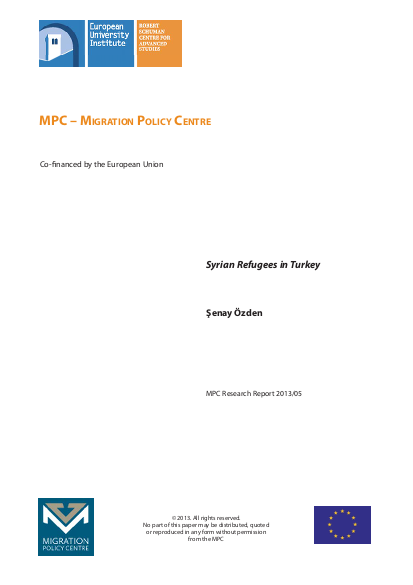
This report provides an overview of Syrian migration to Turkey since the start of the revolt in Syria in March 2011. The number of displaced Syrians crossing the border into Turkey has dramatically risen with the escalating use of violence employed by the Syrian regime ito suppress the revolt. According to the United Nations Refugee Agency, 182,621 Syrian refugees were living in Turkey mid-February 2013. With the influx of huge numbers of Syrians into Turkey, anti-immigrant, anti-Arab discourses have surfaced among the Turkish public. Furthermore, due to the Turkish governments’ openly hostile position to the Syrian regime, Syrian migration became closely linked with Turkish domestic politics and foreign policy. Those individuals and political bodies critical of the Turkish government assumed an anti-immigrant position accusing displaced Syrians of being armed, sectarian rebels. Therefore, analyzing the Syrian migrant community in Turkey means contextualizing it within the political framework of the host-society.
This study utilized qualitative research methods, conducting open-ended interviews with Syrian activists, Free Syrian Army members and collecting the life stories of displaced Syrians residing in the camps and in cities in Turkey. Fieldwork for this study is limited to the provinces of Gaziantep, Kilis, Islahiye, Hatay and Istanbul.
Government hospitals in Gaziantep and Kilis, where wounded Syrians get treatment, were visited; doctors treating the Syrians were interviewed. Interviews with national and international organizations such as IHH (Humanitarian Relief Foundation, a Turkish NOGO)), UNHCR, AFAD and Chambers of Commerce were conducted. Medical centers run by private donors and unofficial schools for Syrian children were visited. Government officials and camp administrators in Kilis and Islahiye were interviewed. Individuals from the local host communities were interviewed in order to get an assessment of the interactions between the Syrian and the local populations.
Researchers, journalists, local and international organizations have been strictly banned from entering the camps even though the authorities seem to have relaxed this policy in the past few months. I had access to two camps: the container camp in Kilis and the tent camp in Islahiye. During my time in the camps, I had no chance to speak to Syrians since in both cases I was accompanied by the camp administrators who did not allow me to do so. However, I had external access to camp residents and talked to them freely while they were outside the camp.